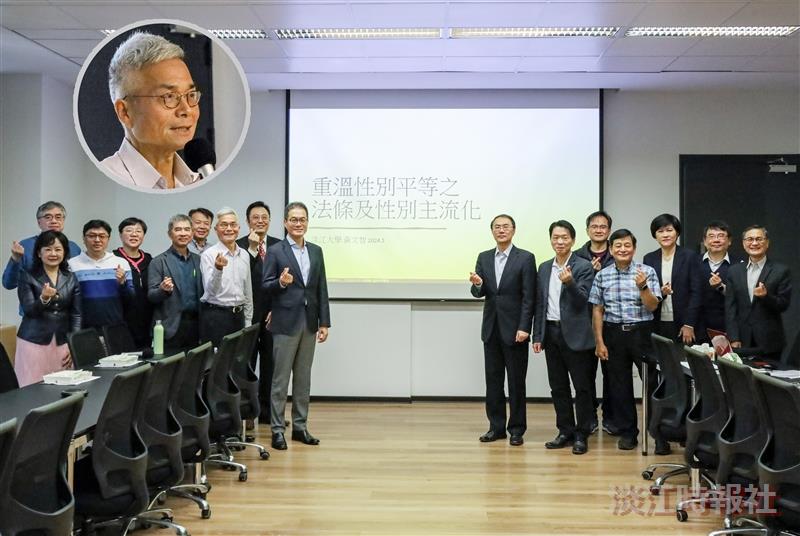News and Events
Mainstreaming Gender Equality: Wen-Chih Huang Details the Journey of Gender Equality Advocacy
Date 2024-03-11 298 Clicks

Mainstreaming Gender Equality: Wen-Chih Huang Details the Journey of Gender Equality AdvocacyThe Gender Equality Committee Holds a Seminar on Gender Mainstreaming, with the Chief Secretary of the Board of Trustees, Wen-Chih Huang, as the Speaker.
On March 5, the Gender Equality Commission held a seminar on gender mainstreaming in Hsu Shou-Chlien International Conference Center. Wen-Chih Huang, Chief Secretary of the Board of Trustees, was invited to share insights on “Revisiting Gender Equality Laws and Promoting Gender Mainstreaming”. Vice President for Academic Affairs, Dr. Hui-Huang Hsu, Vice President for Administrative Affairs, Dr. Chun-Hung Lin, and first-level supervisors of Tamkang University attended the session. During his speech, Dr. Lin explained that Tamkang University, as a partner institution in the trial project for gender mainstreaming under the Ministry of Education's project - “the Establishment of the Gender Mainstreaming Resource Center for Higher Education Institutions”, has been organizing various gender equality-related discussions on campus. He hoped these efforts would further advance gender mainstreaming initiatives within Tamkang University.
At the beginning of the seminar, Wen-Chih Huang referred to the 1967 Boston Marathon, highlighting its significance in providing women with opportunities to excel in sports. Following 1972, women gained eligibility to participate in marathons, which subsequently influenced the development standards of the entire sports industry, including significant events such as the Olympics, with recent increases in the participation of transgender individuals. He then outlined the history of gender equality development, notably mentioning the United Nations' adoption of the Convention on the Elimination of All Forms of Discrimination against Women (CEDAW) in 1979. This convention aimed to ensure gender equality in local legal systems, establish institutions to effectively protect women from discrimination, eliminate all forms of discrimination against women by individuals, organizations, and businesses, and safeguard reproductive rights. The CEDAW has become a cornerstone of women's rights legislation, open for signature and ratification by all nations. Currently, 189 countries, including ours, have participated, with reports on its effectiveness submitted every four years. Furthermore, he highlighted the “Beijing Declaration and Platform for Action,” presented at the Fourth World Conference on Women in 1995, which officially adopted “gender mainstreaming” as a global strategy to achieve gender equality goals.
Finally, Wen-Chih Huang mentioned that Tamkang University's Gender Equality Committee was established in 2004, in accordance with the Gender Equity Education Act, one of the 3 Acts regarding Gender Equality. In addition to this, the Gender Equality in Employment Act also applies to campus environments. He pointed out that due to the broader scope of the Gender Equality in Employment Act, many cases cannot be publicly disclosed, and it is not applicable to punishments in other places, making the handling process more cumbersome. Following this, he shared that since 2005, Tamkang University has actively promoted gender mainstreaming on campus through the use of 6 primary tools: “gender statistics,” “gender analysis,” “gender budgeting,” “gender impact assessment,” “gender awareness empowerment,” and “gender equality mechanisms.” In addition to implementing gender equality between the two sexes, he also believes it is equally essential for students to learn to respect the LGBTQ community.
SDGs #SDG04 Quality Education #SDG05 Gender Equality
LINKS
- PREV:Women’s Association General Assembly: 100+ Participants Celebrate International Women's Day 2024-03-11
- NEXT:Tamkang Shines at University Expo, Faculty and Students Unite in Recruitment Efforts 2024-03-11
- Crossing Seas for Exchange with Waseda University: Dr. Chiu-Kuei Tseng Visits Haruki Murakami 2024-04-08
- Formosa Scholarship Donor Visits President at School 2024-04-08
- TQM Seminar: Exploring New Chapters in Leadership Wisdom and Green Practices Together 2024-03-29
- Mass Communication Alumnus Chien-Hung Lien's Work Salli Wins Award in Osaka 2024-03-25
- 256 Young and Aged Volunteers Served at the Wan Jin Shi Marathon 2024-03-25
- North Tamsui USR Project: 10 Delicacies Revive Mackay’s Missionary Journey in Taiwan 2024-03-25
- Administrative Unit Digital Transformation and Net Zero Exhibition, President Keh Acknowledge Smart Initiatives for Sustainability 2024-03-25
- 2024 Net Zero Transition Alliance Summit: Inviting Alumni Enterprises to Collaborate in Cultivating Sustainability Talents 2024-03-16
- Alumni Reunion Spring Feast: Samuel Su and Jian-Fu Li Lead Singing of School Anthem, Andy Chen Donates NT$16.25 Million 2024-03-16
- Tamkang Shines at University Expo, Faculty and Students Unite in Recruitment Efforts 2024-03-11